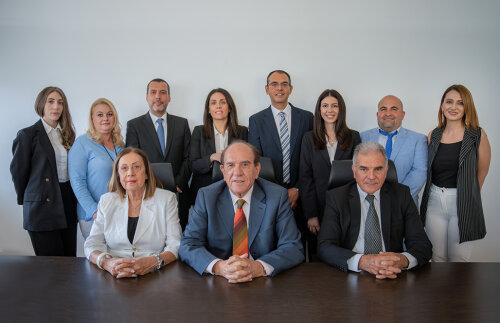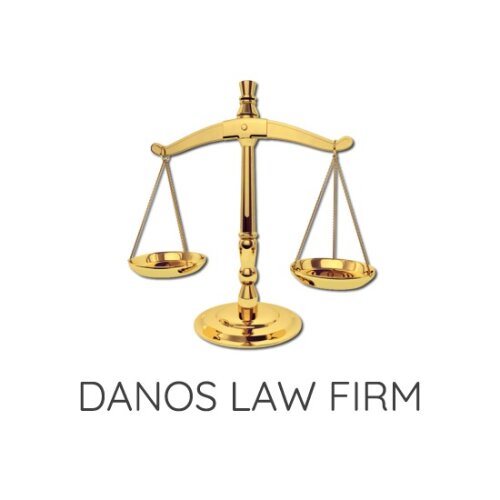Best Renewable & Alternative Energy Lawyers in Limassol
Share your needs with us, get contacted by law firms.
Free. Takes 2 min.
List of the best lawyers in Limassol, Cyprus
About Renewable & Alternative Energy Law in Limassol, Cyprus
Renewable and alternative energy refers to the production and use of energy from sources that are naturally replenished, such as solar, wind, biomass, geothermal, and hydroelectric power. In Limassol, Cyprus, the interest in these energy sources is growing rapidly due to environmental concerns, the need for energy independence, and EU directives aimed at reducing carbon emissions. The legal framework governing renewable energy in Limassol is shaped by national legislation, European Union regulations, and local policies, all designed to support, regulate, and encourage the development and integration of renewable energy solutions in both the public and private sectors.
Why You May Need a Lawyer
There are several situations where individuals, businesses, and organizations may require legal assistance in the field of renewable and alternative energy in Limassol. These include:
- Navigating the complex permitting process for installing solar panels or wind turbines
- Drafting and negotiating Power Purchase Agreements (PPA) and supply contracts
- Ensuring compliance with local, national, and EU environmental and energy regulations
- Resolving disputes related to land use, planning, and grid connection
- Seeking guidance on government grants, subsidies, or incentives for renewable projects
- Managing intellectual property rights for innovative renewable technologies
- Handling energy trading, distribution, or investment contracts
- Advising communities or homeowner associations on shared renewable installations
- Dealing with regulatory issues with Cyprus Energy Regulatory Authority (CERA)
- Addressing potential liabilities related to environmental impact or operational risks
Local Laws Overview
The legal landscape for renewable and alternative energy in Limassol operates within the broader framework of Cyprus legislation and European Union directives. The Electricity Market Law and several Environmental Protection Laws govern how renewable energy projects are developed and run. Cyprus’s National Action Plan for Renewable Energy, in line with the EU’s Renewable Energy Directive, sets ambitious targets for renewable energy use and outlines mechanisms for support such as feed-in tariffs, net metering, and investment incentives. Local municipalities, including Limassol, have their own planning and building permit requirements for renewable energy installations. The Cyprus Energy Regulatory Authority (CERA) oversees licensing and market regulation, while the Department of Environment monitors compliance with environmental impact assessments.
Frequently Asked Questions
What types of renewable energy are most commonly used in Limassol?
Solar energy is the most prevalent due to high sunlight levels, followed by small-scale wind and biomass projects.
Is it necessary to get a permit to install solar panels on my property?
Yes, you must obtain planning and building permits from your local municipality before installing solar panels, whether for residential or commercial use.
Are there government incentives for renewable energy projects?
The Cyprus government offers various grants and schemes, especially for solar photovoltaics, energy efficiency improvements, and small wind turbines, subject to eligibility.
How are renewable energy projects regulated?
Regulation is handled mainly by the Cyprus Energy Regulatory Authority (CERA) and the Department of Environment, each overseeing different aspects such as licensing, grid connection, and environmental impact.
What is net metering and is it available in Limassol?
Net metering allows solar panel owners to offset their electricity usage with the power they generate, feeding surplus electricity back into the grid. It is available in Limassol subject to application and technical criteria.
Can businesses sell electricity generated from renewables back to the grid?
Yes, businesses can supply electricity to the grid, but they need the appropriate licenses and must comply with regulatory requirements.
Do I need to conduct an Environmental Impact Assessment (EIA) for my renewable energy project?
EIAs are required for larger scale projects and when specified by local authorities, especially if the installation has potential environmental effects.
How can legal representation help me in renewable energy matters?
A lawyer experienced in renewable energy can guide you through regulatory requirements, help secure permits, draft contracts, navigate government incentives, and resolve any disputes that may arise.
Who is responsible for grid connection and what are the main challenges?
The Electricity Authority of Cyprus (EAC) manages grid connections. Challenges can include meeting technical criteria, grid capacity limitations, and coordination with regulatory bodies.
What happens if my renewable energy project does not comply with the law?
Non-compliance can lead to fines, dismantling of illegal installations, revocation of permits or licenses, and in severe cases, criminal prosecution.
Additional Resources
For those seeking further information or assistance, the following resources and organizations are valuable in the field of renewable and alternative energy in Limassol, Cyprus:
- Cyprus Energy Regulatory Authority (CERA)
- Ministry of Energy, Commerce and Industry
- Department of Environment
- Limassol Municipality Planning Department
- Cyprus Institute of Energy
- Electricity Authority of Cyprus (EAC)
- Cyprus Employers and Industrialists Federation (OEB) - Renewable Energy Section
- Chamber of Commerce and Industry - Energy Committees
Next Steps
If you need legal assistance regarding renewable and alternative energy in Limassol, begin by identifying your specific needs, such as permit acquisition, contract review, compliance checks, or dispute resolution. Gather any relevant documents and information about your project or situation. Seek a lawyer or law firm with demonstrated experience in local and European energy law. Arrange an initial consultation to evaluate your options and understand the costs involved. Remember that early legal advice can help prevent costly mistakes and ensure your project proceeds smoothly and in line with all applicable laws and regulations.
Lawzana helps you find the best lawyers and law firms in Limassol through a curated and pre-screened list of qualified legal professionals. Our platform offers rankings and detailed profiles of attorneys and law firms, allowing you to compare based on practice areas, including Renewable & Alternative Energy, experience, and client feedback.
Each profile includes a description of the firm's areas of practice, client reviews, team members and partners, year of establishment, spoken languages, office locations, contact information, social media presence, and any published articles or resources. Most firms on our platform speak English and are experienced in both local and international legal matters.
Get a quote from top-rated law firms in Limassol, Cyprus — quickly, securely, and without unnecessary hassle.
Disclaimer:
The information provided on this page is for general informational purposes only and does not constitute legal advice. While we strive to ensure the accuracy and relevance of the content, legal information may change over time, and interpretations of the law can vary. You should always consult with a qualified legal professional for advice specific to your situation.
We disclaim all liability for actions taken or not taken based on the content of this page. If you believe any information is incorrect or outdated, please contact us, and we will review and update it where appropriate.












